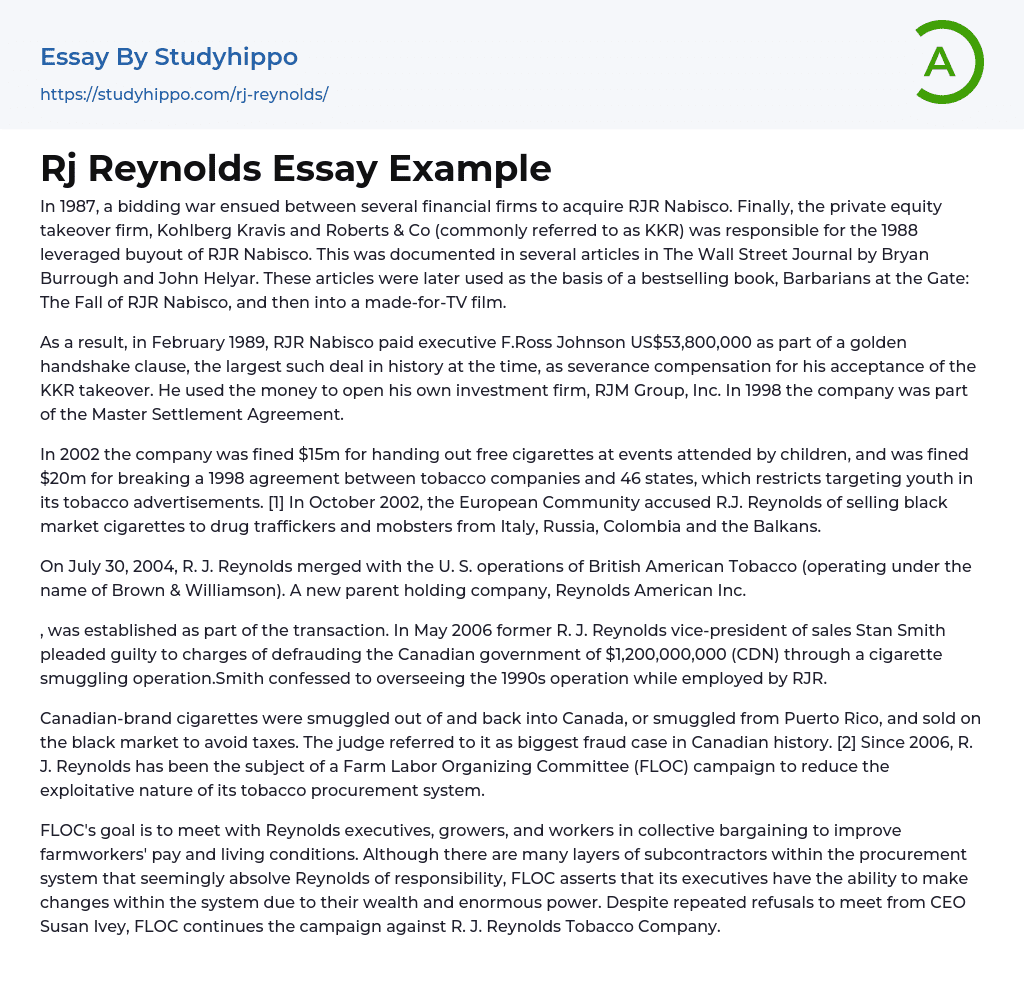KKR, or Kohlberg Kravis and Roberts & Co, won a bidding war among multiple financial firms to acquire RJR Nabisco in 1987. The acquisition was completed in 1988 via a leveraged buyout. Bryan Burrough and John Helyar covered the events extensively in The Wall Street Journal, and their articles served as the basis for the popular book Barbarians at the Gate: The Fall of RJR Nabisco and subsequent made-for-TV movie.
In February of 1989, RJR Nabisco gave executive F. Ross Johnson a severance compensation of US$53,800,000 as a result of the golden handshake clause, which was the most significant deal of its kind at the time. The pay was made in light of his acceptance of the KKR takeover, and he utilized the funds to start his firm, RJM Group, Inc. The company became involved in the Master Settlement Agreement by 1998.
In 2002, R.J. Reynolds
...encountered several legal issues that resulted in fines and accusations. Firstly, the company was fined $15m for distributing cigarettes at events attended by minors. Secondly, they were fined $20m for violating a 1998 agreement that restricted targeting young people in tobacco advertisements across 46 states. Finally, during October of that year, the European Community accused R.J. Reynolds of selling black market cigarettes to drug traffickers and mobsters from countries such as Italy, Russia, Colombia and the Balkans.
[1]
Reynolds American Inc. was established on July 30, 2004 as a result of the merger between R. J. Reynolds and Brown & Williamson's U.S. operations, which was a subsidiary of British American Tobacco.
Stan Smith, who served as the vice-president of sales at R.J. Reynolds in the 1990s, participated in a cigarett
smuggling scheme worth $1.2 billion (CDN) that cheated the Canadian government. After a transaction in May 2006, an establishment was formed and Smith pleaded guilty to charges connected to his participation.
The largest fraud case in Canadian history involved the illicit transportation of Canadian cigarettes to Puerto Rico and back into Canada, allowing for tax-free sales on the black market. Meanwhile, R.J. Reynolds has been under scrutiny since 2006 by the Farm Labor Organizing Committee (FLOC) due to exploitative practices within their tobacco procurement system.
FLOC aims to enhance the compensation and quality of life for farmworkers by engaging in discussions with Reynolds executives, growers, and laborers. Though the procurement system is intricate and involves numerous subcontractor layers that may appear to release Reynolds from responsibility, FLOC believes that the company's leaders possess adequate influence and resources to effect changes within this system. Despite CEO Susan Ivey's refusal of several invitations, FLOC persists in its endeavors to focus on R.J. Reynolds Tobacco Company.
- Accounting essays
- Marketing essays
- Automation essays
- Business Cycle essays
- Business Model essays
- Business Operations essays
- Business Software essays
- Corporate Social Responsibility essays
- Infrastructure essays
- Logistics essays
- Manufacturing essays
- Multinational Corporation essays
- Richard Branson essays
- Small Business essays
- Cooperative essays
- Family Business essays
- Human Resource Management essays
- Sales essays
- Market essays
- Online Shopping essays
- Selling essays
- Strategy essays
- Management essays
- Franchising essays
- Quality Assurance essays
- Business Intelligence essays
- Corporation essays
- Stock essays
- Shopping Mall essays
- Harvard Business School essays
- Harvard university essays
- Trade Union essays
- Cooperation essays
- News Media essays
- Waste essays
- Andrew Carnegie essays
- Inventory essays
- Customer Relationship Management essays
- Structure essays
- Starting a Business essays
- Accounts Receivable essays
- Auditor's Report essays
- Balance Sheet essays
- Costs essays
- Financial Audit essays
- International Financial Reporting Standards essays
- Tax essays
- Accountability essays
- Cash essays
- Principal essays




